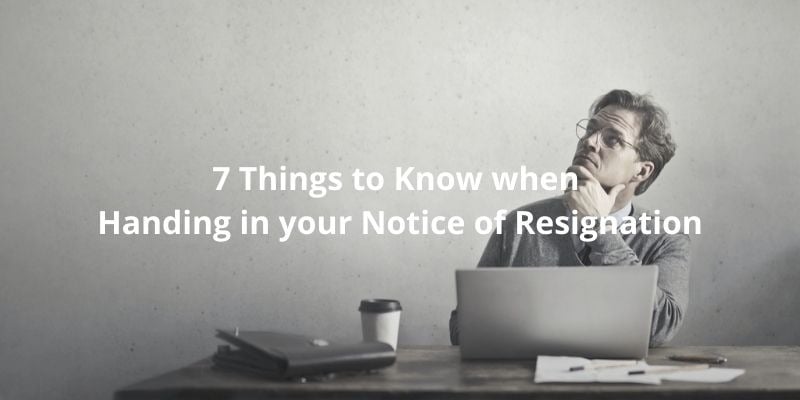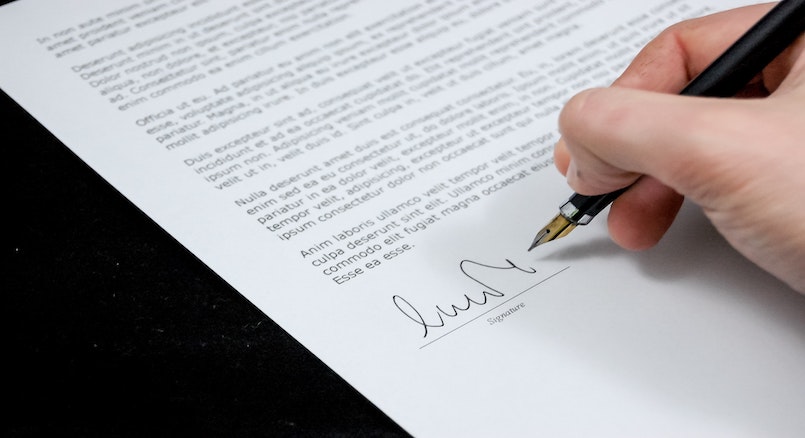Leaving on a High Note: 7 Things to Consider When Handing in Your Notice of Resignation
30 Jan 2023
7 Aug 2020
min read

Unfortunately, resigning from a job is not as easy as merely saying you want to resign. That is only the first step – there are a set of standard procedures you must comply with to hand in your Notice of Resignation. A Notice of Resignation is a written letter that announces your intent to leave an employment position you are holding. We will be going through the top 7 things you need to know when handing in your Notice of Resignation, such as leaving on good terms, safeguarding your reputation, and prevent any potential disputes with your ex-employer.

1. Check Your Notice Period
What is a Notice Period?
A notice period is the length of time that runs between the submission of your resignation letter and the end of your last working day. It begins when you submit a formal resignation letter indicating that you wish to terminate the employment relationship, via email or mail to your employer. You need to serve the full notice period before your official departure, or you might be held legally accountable for any damages.
Giving notice to your employer is important for both of you, even if you do not have a job offer before your leave. It is unprofessional for you to leave your position with no formal notice. Giving in a notice also enables the employer to find suitable replacements during your notice period and suffer from less hindrance to the operations when your resignation takes effect.
How Much Notice Do I have to Give - Is Immediate Resignation Possible?
You should first read your employment contract or your company’s employees’ handbook to check the required notice period and other entitlements to avoid possible disputes between you and your employer.
It is common practice to make the notice period clear in employment contracts; the notice period is not usually less than 7 days. In practice, the most common notice period is 1 month for junior employees and 1-3 months for more senior employees. You are required to strictly adhere to these requirements, or you may be breaching your employment contract.
Even if your contract does not expressly stipulate a period regarding the notice period you should serve, there is a legal minimum regarding the minimum duration of the notice period. The legal minimum is different for different jurisdictions.
-
-
United Kingdom
The relevant statutory provision is the Employment Rights Act 1996. The legal requirement of the notice period is summarised below.Employment Condition
Notice Period
Less than 1 month
Not required
Employed between 1 month and 2 years
Not less than 1 week
Employed between 2 and 12 years
Not less than 1 week’s notice for each year with a maximum of 12 weeks
Employed for 12 years or more
Not less than 12 weeks
When the notice period is not expressly stated in the Employment Contract and Employee’s Handbook, Common Law notice applies where a reasonable length of notice will be implied into the contract of employment.
-
Australia
The relevant statutory provision is The Fair Work Act 2009.
If the Employment Contract is silent about the agreed notice period, the employee might need to give reasonable notice. However, an award and an agreement-free employee do not have to give notice to their employer before resigning if their Employment Contract is silent about the agreed notice period.
-
Hong Kong
The relevant statutory provision is the Employment Ordinance (Cap. 57). The legal requirement of the notice period is summarised below.
Employment Condition
Notice Period
Within 1st Month of Probation
Not required
After 1st Month of Probation
Not less than 7 days
After Probation Period
Not less than 1 month
Nevertheless, you may resign without any notice or payment in lieu of notice if:
-
- You reasonably fear for your physical safety by violence or disease;
-
You are being mistreated or abused by your employer; or
-
You have been employed for not less than five years and are certified by a registered medical practitioner or a registered Chinese medicine practitioner as being permanently unfit for the type you are being engaged in.
-
What is Payment in Lieu of Notice?
Instead of giving notice, the employee can make a Payment in Lieu of Notice to the employer. The payment is usually equivalent to the employee’s salary during the notice period, which allows for immediate resignation by the employee. This may occur if the new employer is desperate for the employee to start immediately and is willing to cover the Payment in Lieu of Notice for the immediate release of the employee.
Can I Take Holiday During my Notice Period?
Normally, you would be entitled to full normal pay and entitlements during your notice period. However, the rules regarding taking holidays during the notice period vary between jurisdictions. To avoid disputes, we recommend you consult the Human Resources Department of your company or your manager before going on holiday.
-
-
United Kingdom
Employees are allowed to take all unused statutory annual leave. However, the exact number of dates the employee is allowed to take depends on the number of holidays they have accrued each month and how much of the holiday year has passed. If an employee has not taken their full annual leave entitlement, the employer can only reject their request to go on a holiday for valid business reasons. -
Australia
Employees are allowed to take annual leave during their notice period if they have their employer’s consent. -
Hong Kong
Employees are usually not allowed to take annual leave during their notice period as they are not included in the length of notice required to terminate a contract of employment under the Employment Ordinance. However, the Court of Final Appeal held that such restriction does not apply when an employee resigns and an employee who chooses to resign from his/her job may take annual leave during his/her notice period. Nevertheless, the final interpretation rests with the court. You should consider the requirements of the law and the ruling of the Court of Final Appeal before you take annual leave during your notice period.
-
2. Check your Employment Contract and Employees' Handbook
The last thing you would want to see when resigning from a job is to find yourself inadvertently breaching legal obligations under your employment contract. Even worse is if your previous employer decides to commence legal proceedings because of the breach. Not only would you ruin your relationship with the previous employer, but you may also suffer from potential reputation and monetary loss.
You need to check your Employment Contract and Employees’ Handbook before handing in your notice. In addition to checking on the length of the required notice period and your entitlements, you should also check whether there are any requirements for garden leave and non-compete clauses.
Please click on the link below to see the typical clauses included in an Employment Contract:
https://docpro.com/doc277/employment-agreement-senior-employee-without-share-options-company
Please click on the link below for provisions typically included in an Employees’ Handbook:
https://docpro.com/doc1158/employee-handbook-manual-company
What is Garden Leave?
Garden leave refers to the circumstances in which your employer requires you not to work at the company’s premises during the notice period. Garden leave clauses are often included in Employment Contracts as it is a common and popular strategic protectionist measure to prevent potential damaging acts from employees who have terminated their employment.
This is more common for senior employees who have access to sensitive proprietary or client information when they resign, those under disciplinary action or those made redundant from their posts. Usually, this is a paid leave, and the employee is required to sit out until the Garden Leave period expires before starting the new job.
If you want to learn more about the specifics of garden leave, you can check out our dedicated blog post here - https://docpro.com/blog79/garden-leave-what-is-it-and-how-does-it-work.
When are you Required to take Garden Leave?
You may be required to take Garden Leave under two situations: (a) if there is a Garden Leave Clause on your Employment Contract, or (b) if a Garden Leave Clause is not included in your Employment Contract, your employer may require you to go on a Garden Leave with your consent.
During your Garden Leave, you will be confined from working in the office area and be required to work from home or any other place. You will be kept away from your clients, colleagues, confidential information, and trade secrets of your company. Although you are entitled to all the standard pay and entitlements stated in your Employment Contract, going on Garden Leave is different from going on a paid leave – you still have to be on standby and perform your job duties in case your employer requires you to do so.
Non-Compete Clauses
A Non-Compete Clause is a common post-termination restrictive covenant for senior members of companies. These clauses restrict your freedom of choice of work by stating that you are not allowed to work for a competitor or business of a similar nature to your previous company, and you are not allowed to contact your clients for a stipulated period. The specific restrictions and periods vary for each employment contract, so you must read these clauses carefully before you leave your job to avoid unnecessary disputes.
For an example of a non-compete and non-solicitation agreement for employment, please refer to:
Jurisdictions such as the United Kingdom, Australia and Hong Kong adopted a similar approach in determining whether a Non-Compete Clause is enforceable. Courts will only enforce clauses that are designed to protect a “legitimate business interest” and are reasonable.
Also, such clauses rarely exceed 12 months in most common law jurisdictions. If the court finds the Non-Competitive Clause unreasonable with the approach set out above, it has the flexibility to rule it as unenforceable or to sever certain parts of the clause rendering it enforceable in a legal sense.

3. Write a Formal Resignation Letter
Why do you need a Resignation Letter?
A resignation letter is an official, formal document that indicates an employee’s intention to end their current employment. It is a matter of professional courtesy for employees to submit a resignation letter to their employer as it serves as a formal notice indicating the desire to leave. Importantly, it also serves as a record for the company to calculate your required notice period and entitlements.
How to Write a Resignation Letter?
While there are no specific requirements for writing a resignation letter, you might want to play it safe by consulting your superiors or the Human Resources Department of your company to learn more about whether there are any specific requirements for writing a resignation letter. The key to writing a professional Resignation Letter is to keep everything polite, simple, and direct.
The following table summarises the Dos and Don'ts of writing a resignation letter:
|
Do’s |
Don’ts |
|
· Clearly state that you are resigning and the expected leaving date.
· Clearly state the position you are resigning from and the company’s name.
· Include a statement of gratitude: explain how thankful you are for the Company and your regrets for not being able to work together anymore.
· Give a simple reason for your leave.
· Offer assistance for training your successor and finishing your current projects.
· Sound as positively as possible even if you are dissatisfied with your job and can’t wait to leave.
· Sign your resignation letter.
|
· Don’t be vague about your resignation. Include a clear statement for that.
· Don’t get emotional and criticise your colleagues, superiors and the company.
· Don’t include a lengthy reason for your resignation. A brief explanation will suffice.
· Don’t include inappropriate language or make sarcastic comments. Keep it formal.
|
Sample Resignation Letters - Downalod from DocPro Templates:
|
Reasons of Resignation/ Condition |
Link |
|
New Opportunity |
https://docpro.com/doc1452/resignation-letter-to-employer-new-opportunity |
|
Personal Reasons |
https://docpro.com/doc738/resignation-letter-to-employer-personal-reasons |
|
Retirement |
https://docpro.com/doc741/resignation-letter-to-employer-retirement |
|
Neutral |
https://docpro.com/doc735/resignation-letter-to-employer-neutral |
|
Leaving on good terms |
https://docpro.com/doc736/resignation-letter-to-employer-leaving-on-good-terms |
|
Lack of Opportunity |
https://docpro.com/doc737/resignation-letter-to-employer-lack-of-opportunity |
There might be specific requirements for the resignation of certain professionals such as doctors, teachers, lawyers, etc. Take a look at the following link for a resignation letter template for professionals:
|
Resignation Letter to Employer - Teacher |
https://docpro.com/doc1404/resignation-letter-to-employer-teacher |
4. Act Professionally after Handing in Your Notice
Once the tough part is done, you are probably looking forward to your new job and are disengaged with your old work. At this stage, the notice period may feel like nothing more than an inconvenience.
However, you must remember that you are serving your notice period, not going on vacation. Being less involved in your old job is not a valid excuse for being unproductive and unprofessional as your performance during your notice period can leave a lasting impression on your colleagues and your superiors, and strongly influence the reference you receive in the future. Not working or co-operating at the end of your employment can come back to haunt you.
You must remain professional – give 100% of what you can give to preserve the professional relationship and you will leave with a nice reputation as a responsible employee.
During your last days in the company, your superiors and the Human Resources Department of your company might arrange an exit interview with you to have a formal occasion to discuss your experience in the company. It is also a good opportunity to ask your boss / direct supervisor for a reference/recommendation letter.
You should also make sure to tie up loose ties by handing over your duties to your successors and colleagues. You can also take the opportunity to say goodbye to your colleagues by sending them a farewell message.
How to Ask for a Reference/Referral/Recommendation Letter?
If you are leaving on good terms with your employer and you believe he/she knows you well and will give you a strong endorsement, you can consider asking for a reference by submitting an additional letter to your direct boss/immediate supervisor.
Some templates are attached below for your reference:
|
An applicant seeking Reference Letter |
|
|
An applicant seeking Referee |
https://docpro.com/doc732/reference-letter-referee-job-application-applicant-seeking-referee |
5. Prepare for the Exit Interview
Arranging a formal exit interview for leaving employees is typical practice for some companies. Exit interviews are important as they provide a way for the company to gain deeper insight into their workplace culture and business operations from another perspective. Companies can evaluate the overall employee experience and identify solutions to make improvements or necessary changes concerning feedback from former employees.
During your exit interview, you might be asked to elaborate on the reason for your leave, how you feel about your colleagues and superiors, how the company can improve, etc. The key to demonstrating professionalism during an exit interview is to balance truth and tact.
You should avoid ranting or getting emotional during the interview session as it might jeopardise the chances of you leaving without burning bridges. Instead of providing uncorroborated opinions, for example, by gossiping about your former colleagues and superiors, you should provide constructive criticism that can help the company improve.
6. Handover of Your Existing Duties
You should conduct a proper handover process to ensure a smooth and streamlined transition after your leave becomes effective. Although you are not legally required to do so, tying up loose ends brings benefits to both you and your employer. By handing your work to your successors, you can help the new member settle into their position quicker and easier, which will cause fewer disruptions to the company’s operation.
Remember that this is your final opportunity to make a decent impression as a responsible employee. Ensuring that everything is laid out is also just something respectful to do, as your colleagues will likely be bearing an extra workload after your leave.
To perform a decent handover, you should (i) assist the company in training your successor, (ii) delegate incomplete tasks to your colleagues and inform them with sufficient details about the project; and (iii) contact your clients to inform them of your leave and advise them upon who they should contact after your leave.
You should also draft a comprehensive handover note for your successor and colleagues to provide them with in-depth information about the company and/or the work you have delegated to them. Here are some elements that you should include in your handover note:
-
Description of your daily tasks;
-
Project deadlines;
-
Contact details of clients, superiors, and colleagues;
-
Login usernames and passwords; and
-
Housekeeping matters.
If you are unsure about how to draft a handover note and what to include, you may use the template below:
https://docpro.com/doc780/handover-note-departure-from-duties-leaving-employee
7. Writing Farewell Messages
Farewell messages to colleagues, business partners, superiors and clients are extremely important as they can help you extend and strengthen your professional network.
A farewell message is a notification to your colleagues, superiors and clients indicating that you want to leave the company. It is a display of politeness and helps positively end your employment period. Leaving on a positive note is the least awkward way to say goodbye to your previous colleagues and partners.
It is also a good way to preserve professional relationships with people who can benefit your career progression. The world is smaller than you think and you never know who can help in the future.
You should send your farewell messages to everyone you interacted with throughout your employment. If you are working in a big company, it might feel awkward sending farewell messages to staff you have never spoken to before. You should at least send your goodbyes to your department and those you have collaborated with on certain occasions.
You should send your farewell messages after you submit your resignation letter, and before the date of your formal resignation. You may consider sending them a week before your official leaving date to provide sufficient time for your colleagues to react.
Dos and Don’ts in composing a farewell message:
|
Dos |
Dont's |
|
|
Not sure what to say? Just follow our farewell message templates below!
|
Reason for Resignation |
Template |
|
General |
|
|
Change of Job |
|
|
Transfer to city/ department |
|
|
General - Brief Message |
|
|
General - Detailed Message |
https://docpro.com/doc808/last-day-notification-to-colleagues-business-partners-farewell-detailed |
Frequently Asked Questions (FAQ):
1. What are the key considerations for writing a resignation letter? Do you have to give a reason in the resignation letter?
The resignation letter has to comply with the requirements set out in the employment agreement.[1] It is also advisable to refer to your employee handbook for the procedures and requirements before tendering your resignation letter. [2] It is important for a resignation letter to be in writing.[3] A clear intention of leaving the position[4] should be indicated in the letter along with your last working day with the company. [5]
2. What should you not say in a resignation letter?
Allan M. Siegel, Partner, from Chakin, Sherman, Cammarata Siegel, P.C. is of the opinion that you should avoid criticising or disparaging the job or the company. Therefore, it is best to keep the resignation letter short and simple.
3. How do I calculate my notice period?
The notice period is usually specified in the employment contract. It is customary practice to give at least two weeks' notice prior to departure, but it is not necessary if the employment contract doesn't specify one.[6]
[1] Mathew Kerbis, Subscription Attorney LLC <https://subscriptionattorney.com/>
[2] Mathew Kerbis, Subscription Attorney LLC <https://subscriptionattorney.com/>
[3] David Bakke, Recruiter at DollarSanity <https://dollarsanity.com/>
[4] Ben Michael, Attorney, Michael & Associates, <https://zealousadvocate.com/>
[5] James Palestini, criminal defense lawyer and founder of Palestini Law
[6] Allan M. Siegel, Partner, from Chakin, Sherman, Cammarata Siegel, P.C <http://chaikinandsherman.com/
Please note that this is just a general summary about notice for resignation under common law and does not constitute legal advice. As the laws of each jurisdiction may be different, you may want to speak to your legal adviser.
Keywords:



